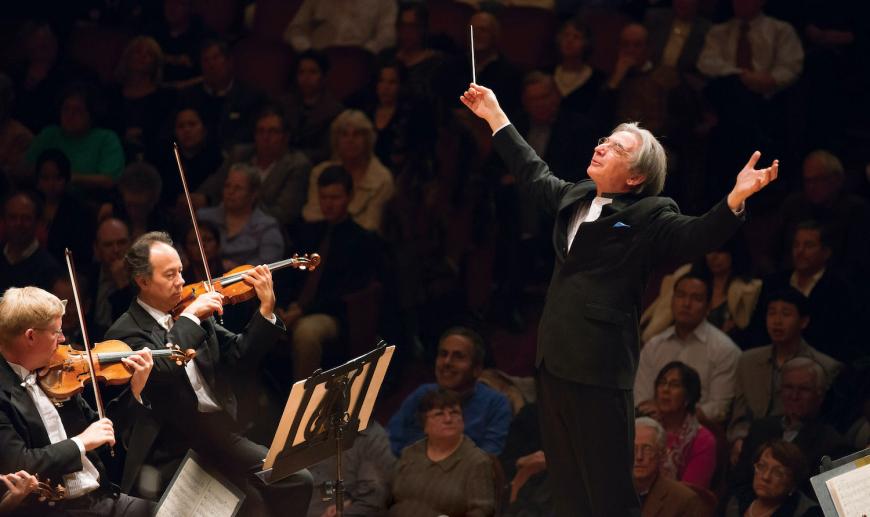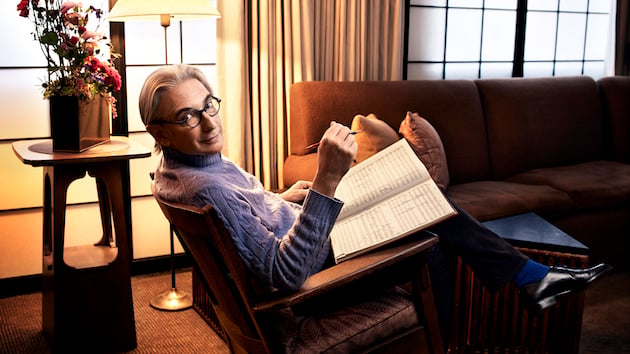
It’s hard to think of Michael Tilson Thomas as old, for he has kept his youthful curiosity, risk-taking, and exploratory instincts going well into his 70s. But here we are in 2021. MTT — as he became commonly known since becoming music director of the San Francisco Symphony in 1995 — will be 77 Dec. 21. Tempus fugit.
He has had some health problems recently — first heart surgery two years ago, then successful surgery for a brain tumor last summer. Yet he has quickly bounced back into action after each setback, and recently completed his first two weeks of concerts as music director laureate of the SFS. He returns to Los Angeles, his birthplace and the city where he got his start at USC and Monday Evening Concerts, for another two weeks of concerts with the Los Angeles Philharmonic in early January. Then he goes immediately back to San Francisco for two more weeks in January and several guest conducting appearances elsewhere after that.
The wide range of posts, concerts, activities, and brainstorms that MTT has had in more than 50 years of music-making as a conductor and pianist can be traced through his large discography. The trail probably starts in Hollywood in 1967 when he played harpsichord continuo on Robert Craft’s recording of Monteverdi’s 1610 Vespers. He was only 22.
The trail goes through posts in Boston, Buffalo, back to Los Angeles, and London, with recordings in a few other music capitals in the U.S. and continental Europe, and some in Miami Beach where MTT founded and is still artistic director of the New World Symphony. The main portion of the trail neatly divides itself into two periods of about 25 years each — the first period taking in the wanderings from 1970 to 1995, and the second one being his quarter-century in San Francisco.

Along the way, Tilson Thomas’s consistent championing of American music is strongly represented — with lots of Charles Ives, Aaron Copland, George Gershwin, Steve Reich, still the only attempt at a complete survey of the limited output of Carl Ruggles, surprisingly little Bernstein given his close association with Lenny, and very recently, his own music. Occasionally the trail zigzags into the orbits of popular music and jazz.
Overall, MTT has one of the most interesting discographies of any conductor — and the following choices are just one longtime listener’s ruthlessly-edited map of where the journey has been:
Tchaikovsky: Symphony No. 1 (Winter Dreams), Debussy: Images, Ives: Three Places in New England, Ruggles: Sun-Treader; Boston Symphony Orchestra; (Deutsche Grammophon, CD, LP, stream, 1970–1971). These are Tilson Thomas’s earliest recordings as a conductor, made not long after he signed on as assistant conductor of the Boston Symphony. DG had enough confidence in the young conductor, still in his 20s, to let him include some of his American Maverick specialties like Ruggles’s mountainously forbidding Sun-Treader and his first crack at Ives, along with traditional repertoire. They’re wonderful recordings, glowing in sound, but it’s a pity that they seem to be currently available on CD only in a massive 57-disc Boston Symphony megabox. However, they can still be heard on the streaming services, and the original LPs and CD transfers often pop up second-hand.
The Mahavishnu Orchestra: Apocalypse, London Symphony Orchestra, John McLaughlin (guitar) (Columbia, 1974, CD). One thing that set the young Tilson Thomas apart from his contemporaries — and provoked controversy — was his willingness to embrace projects away from the usual classical routine. Such was this beautiful collaboration with one of the leading jazz-rock bands of the early 1970s, the Mahavishnu Orchestra and its alternately lyrical and fiery lead guitarist John McLaughlin. As produced by George Martin — yes, the Beatles’ producer/collaborator — this is one of the most successful fusions of a symphony orchestra and a high-energy electric band, where Michael Gibbs’s lush yet never superficial arrangements blend congenially with the band yet know when to stay out of their way. Best track of all is the lengthy closing piece, “Hymn to Him,” which has an unforgettably haunting symphonic introduction.
Gershwin: Rhapsody in Blue, Second Rhapsody, several recorded premieres, Los Angeles Philharmonic (CBS Masterworks, 1985, CD). While he was a principal guest conductor of the LA Phil, Tilson Thomas spent a good deal of time combing through unpublished George Gershwin manuscripts and orchestral scores with the irreplaceable help of the composer’s brother Ira. All of that sleuthing resulted in an important addition to the Gershwin discography, all in spiffy performances attuned to the period. The original Paul Whiteman band edition of Rhapsody in Blue (which MTT has recorded three times in various roles) is here; so is Gershwin’s original vision of the urbane Second Rhapsody. The newsmakers are the premieres of four unheard Gershwin piano pieces (Short Story, Violin Piece, For Lily Pons, and Sleepless Night), and the first recording of the composer’s jaunty orchestration of Promenade (Walking the Dog).
Michael Tilson Thomas Conducts Ives, Royal Concertgebouw Orchestra, Chicago Symphony and Chorus, San Francisco Symphony and Chorus (Sony Classical, four CDs, 1981–1989, 1999). Leonard Bernstein may have ignited the Ives boom of the 1960s but Tilson Thomas carried it through to its ultimate flowering and he’s still Ives’s most persistent, enthusiastic, eloquent advocate. Assembled last year, this mini-box is a terrific bargain, gathering together all of MTT’s benchmark Ives recordings for CBS Masterworks and RCA in three cities, including all four symphonies, the New England Holidays Symphony, and several orchestral pieces and songs. The disc with the SFS, An American Journey, came along 10 years after the others, and it’s a near-ideal capsule portrait of what this iconoclastic composer was about. Framing a collection of delightfully eccentric or profound Ives songs, From the Steeples and the Mountains is the prelude, Three Places in New England the centerpiece, and The Unanswered Question the only possible epilogue.
Stravinsky in America, London Symphony Orchestra (RCA, 1996, CD). MTT’s association with Stravinsky goes all the way back to his teens when he knew and worked with the great composer at Monday Evening Concerts in Los Angeles. While MTT has recorded a lot of Stravinsky over the decades, I chose this highly entertaining, remarkably varied collection of 10 pieces, short and long, that he wrote after emigrating to the U.S. The set is arranged in chronological order, opening at a point where Stravinsky is still working through his neoclassical period and covering his transition into serialism while living in the Hollywood Hills above the Sunset Strip. Tilson Thomas’s performances by now had acquired a patina of elegance in works like Ode and Scenes de Ballet yet there is still a lot of youthful exuberance in Scherzo à la Russe and Circus Polka. The partly-serial ballet Agon, which MTT calls “souvenirs of a season at Monday Evening Concerts,” receives its best performance on record, full of playful bounce and panache.
The Mahler Project, San Francisco Symphony and Chorus (SFS Media, 17 SACDs, 1996, 2001–2009). When MTT’s contract with RCA expired, the San Francisco Symphony chucked the idea of finding another big label and started one of its own, audaciously aiming to record all of Mahler’s completed symphonies as its first project. From there, the project was expanded to include the Adagio from Symphony No. 10, all of the song cycles, and some songs from Des Knaben Wunderhorn, along with a 1997 Das Klagende Lied licensed from RCA. Eventually gathered into a 17-SACD box and an imposing limited-edition 23-LP slipcase, the project established the MTT/SFS team as world-class Mahlerites with these passionate, splendidly played and recorded performances. If the entire set is a little too rich for your appetite or wallet, try some individual discs, perhaps starting with a high-tension Symphony No. 6 –recorded the day after 9/11 — or a seductive, intensely musical Das Lied von der Erde with heldentenor Stuart Skelton and baritone Thomas Hampson that will leave you speechless at the close.
Keeping Score, San Francisco Symphony (SFS Media, nine DVDs or Blu-ray, 2004–2011). MTT’s major educational venture during his years in San Francisco was this highly addictive, insightful series of eight films, each devoted to a single composer. Again, Bernstein provided the model with his televised New York Philharmonic Young Peoples Concerts (which Tilson Thomas took over for a while after Bernstein left the orchestra). But MTT and the SFS crew pushed the concept a lot further into full-blown documentaries, going on location to the composers’ own stomping grounds in the U.S. and Europe, using more sophisticated filming techniques and incorporating commentary from members of the SFS. Tchaikovsky, Stravinsky, Beethoven, Copland, Shostakovich, Berlioz, Ives, and Mahler are the composers, with Mahler getting twice as much air time as the others. Each film also comes with a video performance of a key work by each composer. The good news for those curious about the series is that during the pandemic, all of the Keeping Score programs were made available on YouTube for free — and they’re still on the site.
American Mavericks, San Francisco Symphony, Jeremy Denk (piano), Paul Jacobs (organ) (SFS Media, SACD, 2010, 2012). MTT’s American Mavericks festivals were the most musically audacious projects of his 25 years at the SFS. A single disc cannot hope to encompass the entire scope of these events, but this one offers a glimpse of their audacity via a couple of oddball West Coast composers and one transplant from France. Henry Cowell’s Synchrony has strange clusters cluttering up the harmony within a symphonic body, and his Piano Concerto has plenty of them as well as Jeremy Denk, who exuberantly pounds the bejeebers out of the piano. Lou Harrison’s Concerto for Organ and Percussion Orchestra picks it up from there with a cascade of crunching sound, with more to come, separated by quiet meditations. The seminal noisemaker of them all, Edgard Varèse’s Ameriques, closes the disc spectacularly.
Masterpieces in Miniature, San Francisco Symphony, Yuja Wang (piano) (SFS Media, SACD, 2010–2014). When Tilson Thomas was about to turn 70, he did something counter-intuitive. Instead of recording a huge celebratory work or putting out a massive omnibus boxed set, he issued this collection of exquisite miniatures that in a back-to-the-future way is a throwback to how short, sweet encores were marketed in the era of 78 RPM single discs — which now happens to fit today’s streaming formats. Lyrical pieces like Rachmaninoff’s Vocalise, Sibelius’s Valse Triste, Mahler’s “Blumine” movement, and others of that genre are framed with rousers — a Henry Litolff Scherzo done to a barn-burning turn with Yuja Wang on piano, and the “Cortège de Bacchus” from Delibes’s Sylvia (which was the theme for a classical radio program that MTT heard while growing up in L.A.). The disc is also a showcase for the dark, sleek, luscious sound that the SFS developed during the MTT years.







